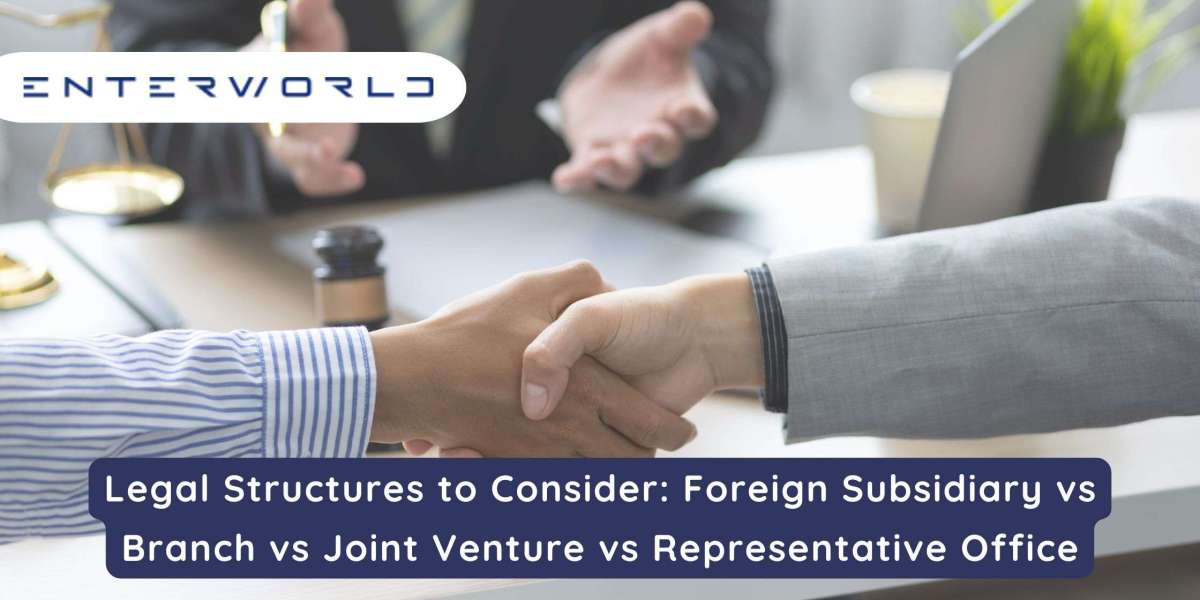Expanding your business into a new country is a major strategic move. But before you hire staff, sign contracts, or rent office space, there’s a critical question to answer: What legal structure should you use?
Whether you're entering a new market temporarily, testing waters, or planning a full-scale operation, choosing the right structure—foreign subsidiary, branch office, joint venture, or representative office—will directly impact your legal liability, tax exposure, and operational freedom.
Let’s break down these four popular business structures and help you understand which one is most suitable for global business setup.
1. Foreign Subsidiary
A foreign subsidiary is a locally incorporated entity that is fully or majority owned by a foreign parent company. It operates as a separate legal entity under the laws of the host country.
When to choose it:
If you're making a long-term investment, hiring employees, generating revenue locally, and want full operational control, a foreign subsidiary offers flexibility and credibility.
Key benefits:
- Limited liability protection for the parent company
- Full control over operations
- Eligible for local tax incentives or benefits
- Seen as a local company, which builds trust with regulators and customers
Considerations:
- Higher setup and compliance costs
- Must adhere to local corporate regulations
- Subject to local taxation on income
This is a good choice if you plan to establish a permanent presence in the market and handle full business operations independently.
2. Branch Office
A branch office is an extension of the parent company, not a separate legal entity. It can conduct business in the host country, but all liabilities flow back to the parent.
When to choose it:
A branch office is suitable when you want to operate in the country but maintain tighter control and integration with the head office.
Key benefits:
- Easier to set up than a subsidiary
- No need for separate capital base or board
- Streamlined reporting to the parent company
Considerations:
- Parent company bears full liability for the branch’s obligations
- May not qualify for local tax benefits
- Local customers or partners may see it as “foreign” rather than local
Branch offices work well when you want to expand services under the parent company’s brand without creating a new legal identity.
3. Joint Venture (JV)
A joint venture is a legal partnership between your company and a local entity or individual to pursue a common business objective. JVs can be incorporated or unincorporated depending on the jurisdiction and agreement.
When to choose it:
If you need local market knowledge, regulatory access, or want to share the investment risk, a JV could be the right path.
Key benefits:
- Access to local partners’ networks, licenses, and infrastructure
- Shared costs and risks
- Opportunity to build strong local alliances
Considerations:
- Shared decision-making can lead to slower processes
- Disagreements between partners may disrupt business
- Exit terms and shareholding must be carefully structured
JVs are ideal for industries with local ownership restrictions or for companies entering highly regulated markets, such as telecom, defense, or energy.
4. Representative Office
A representative office is the most limited structure—used mainly for research, promotion, or liaison activities. It is not allowed to conduct direct sales or earn revenue.
When to choose it:
Use this structure if you're exploring the market, meeting potential clients, or building brand awareness before committing to a full business setup.
Key benefits:
- Easy and inexpensive to establish
- Minimal compliance burden
- Good for initial market entry or brand presence
Considerations:
- Cannot generate revenue or sign contracts
- Often has strict local restrictions
- Staff may be limited to non-commercial functions
This is the right option if you’re testing the waters and want a low-risk way to study the local landscape before scaling up.
Choosing the Right Structure: What to Ask Yourself
Before deciding which legal structure to use for your international expansion, ask these key questions:
- What are our short and long-term goals in this market?
- How much control do we want to retain?
- Are there local laws that require joint ownership or limit foreign control?
- What is our budget for setup and compliance?
- Do we plan to generate revenue immediately or explore first?
There’s no one-size-fits-all. For example, a tech startup may begin with a rep office, transition to a JV with a local distributor, and later set up a full subsidiary once product-market fit is confirmed.
Final Thoughts
Choosing the right legal structure for international expansion is a strategic move that can make or break your success in a foreign market. Each option—foreign subsidiary, branch, joint venture, or representative office—comes with its own level of commitment, cost, and legal complexity.
Start by aligning your business objectives with the structure that gives you the right balance of flexibility, control, and compliance. And remember—local regulations vary widely. Consulting with legal and tax advisors in the target market is not just helpful—it’s essential.
FAQs
1. Can a foreign company directly hire employees in another country without a local entity?
In most cases, no. Hiring employees typically requires a legal entity or working with an Employer of Record (EOR).
2. Is a branch office taxed the same as a subsidiary?
Not always. Subsidiaries are taxed as local companies, while branch offices may face withholding or different corporate tax treatments. Always check local tax laws.
3. Which is the easiest structure to set up?
A representative office is usually the easiest and cheapest to establish but comes with strict limitations.
4. Can a JV eventually become a full subsidiary?
Yes. Many JVs start with shared ownership and, over time, one partner may buy out the other, converting the structure into a wholly-owned subsidiary.



